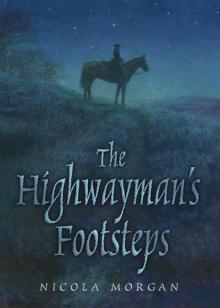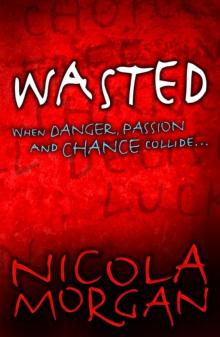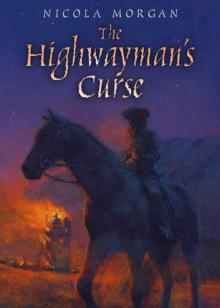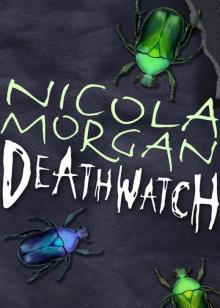- Home
- Nicola Morgan
The Highwayman's Curse
The Highwayman's Curse Read online
Dedicated …
… to seven amazing teenagers: Brogan Donnelly, George Reader, Samantha Pearson, Peter Stalley, Ryan Liddy, Emma Quinn and Emil Franchi, all from the remarkable St John’s Catholic School & Sixth Form Centre in County Durham. Their dynamism, energy and creativity were an inspiration and it was a privilege to work with them. They are stars and deserve a bright future.
My thanks as well to the wonderful Linzi Heads, the librarian at St John’s, and all the staff, who entered into the spirit of an unusual project in an extraordinary way.
With thanks …
… to Graham and Buffy Carson for showing me inside a real Galloway tower; to my husband for accompanying me on research trips and only asking for high-quality food, accommodation and golf courses in return; and to my great friend and fellow-author, Franzeska Ewart, for describing a real cave so vividly that I didn’t have to go inside one.
With apologies …
… to those who think that most of the characters in this book should speak in a more Scottish voice. The language they would have spoken is wonderful and rich but I had to accept that too many readers would have stumbled. The Scots among you must give your own voice to the characters as you read.
Introduction by Nicola Morgan
I was so pleased when I heard that my publishers wanted to turn The Highwayman’s Footsteps and The Highwayman’s Curse into eBooks and bring them to more readers. Writing them was perhaps the most fun I’ve had as a writer and I’ve loved seeing people of all ages enjoy the thrilling adventures of Will and Bess. I wanted both highwayman books to be as thrilling as possible and I can promise you plenty of drama and emotion in The Highwayman’s Curse!
If you’ve already read The Highwayman’s Footsteps, you’ve met brave Will and fierce Bess. (Don’t worry if you haven’t: each book also works on its own.) The two friends face different dangers in The Highwayman’s Curse, finding themselves in Scotland and tangled up in the cruel religious hatred of those times. When I was researching the history, I was horrified by the punishments for people worshipping God the “wrong” way.
The bonus of an eBook version is that I can add extra information and links for you, which I’ve put at the end of the book. I’ll answer some questions that readers have asked me and give you links to some of the history. You’ll also find information about the amazing book launch I had in a tiny ancient cottage and how we ended up on television!
But first, the story. Are you ready?
Chapter One
The man was dead. Of this there could be no doubt. No one could survive such a terrible injury.
Bess gripped my arm. Her hand flew to her mouth. Bleary-eyed and still not quite awake, I tried to gather my thoughts. I bent down and pulled the man’s cloak so that it hid his staring eyes and the grotesque gash beneath his chin.
This man had not died by accident. Only a sharp knife in a murderer’s hand could have done such damage. Old he was, with thin white wisps of hair like a ghost’s breath over his head. His weathered hands were clawed in pain, or gnarled old age, clutching the soil beneath him.
“It was his hut!” exclaimed Bess. “We slept in his hut!”
We had wondered why the hut was empty when we came upon it the evening before, exhausted, hungry, and somewhat afraid, in this unfamiliar countryside of Scotland. We had guessed it to be a shepherd’s hut, nestled below trees, sheltering in the elbow of a steep hillside. Lighting a lamp with our own flint, we had looked around. A cold fire lay in one corner. Near by, two blankets were folded neatly on a thin, uneven pallet on the floor – whoever slept on such a poor bed would find little comfort. And a few small possessions – a battered tin pot, two pottery cups, a horn spoon, a wooden platter, a sharp knife – sat on a large box. Creamy threads of sheep’s wool were snagged on the splinters of rough wood, or lay on the floor, drifting like puffs of smoke on the draught from the door. Two shepherd’s crooks hung from a warped rafter.
Although desperate to sleep, we had tried to remain awake, to listen for an occupant’s return – two fourteen-year-olds travelling alone in this strange place must surely face unpredictable threats and we were accustomed to remaining alert. But in the darkest hours, Bess on the pallet and I on the floor, each wrapped in a cloak and one blanket, it had seemed to us that no one would come here now. And at last we had slept, though fitfully, the horses standing near us, breathing softly in the small space.
My sleep had been full of scattered dreams, familiar to me now, of redcoats chasing us, the shattering crashes of muskets in the darkness, of my horse, Blackfoot, falling under me and my pistol failing to save me, and of spectral horsemen cursing me with words of powerful magic. In one dream I was fighting my brother again, with swords as before, but this time my brother had overcome me and I had woken, sweating, as his pale eyes and ginger moustache loomed over me and he prepared to plunge the sword into my throat. Truth mixed with terrors, until when I awoke I could not tell which was which. Which was from the past, which the product of my exhaustion, and which a premonition of future danger?
When we had arrived at the hut, in the dark, we had not stumbled across the old man’s body, lying as it was by the stream some fifty paces away. Only in the weak grey light of morning did we find it, as we came to wash our faces and drink our fill of fresh water.
Now, the sight of that gruesome body brought us fully to our senses. Although it was hard to believe that the murderer could still be near by, yet I feared it, and the skin on the back of my neck crawled as though touched. Cautiously, I retrieved my pistols from where they lay on a rock. Bess took hers from the belt of her breeches. Bess, I should say, was dressed in man’s garb, as she most often was, and could fight as well as any I had met. When I had first encountered her, only a few weeks before, she was holding a pistol to my head, and only good fortune had saved me from death at her hands. Since then, she had shown her unwomanly strength on many occasions and I had learnt that the word “unwomanly” had a different meaning from the one I had been brought up to know.
Now, on the run from both the redcoats and my father’s militia, we both had need of courage. And trust. But we had proven ourselves each to the other. I knew I could trust her and I think she knew the same of me. I knew many things about her and her childhood; I knew what kindled the fire in her heart, the fury, the spirit. And she knew of my childhood too, my struggle against my birthright. We had no friends here, not now that we were two days’ ride over the Scottish border. But we had each other.
As long as we had each other, we had some kind of hope.
We looked and listened, straining eyes and ears for signs of danger. A low mist draped nearby hillsides but to the east there gleamed the promise of a brighter day. There the sky was a buttermilk yellow, pale and watery. Dark patches of forest splashed the distant hillsides. Closer to us, large boulders and gorse bushes could be hiding any manner of perils.
As for sounds, at first we could hear only the trickling of the stream as it ran over pebbles; the slight rustling of grasses in the breeze; and then, further away, the mournful crying of seagulls. Nothing to fear.
Averting our gaze from the body, we washed quickly, and filled our water bottles. We began to move from that place, still wary. We walked quickly, making our way back up the slope to the hut. Bess’s forehead was creased; twists of hair hung down bedraggled; dirt smudged her cheeks. Her man’s shirt was splashed with water from the stream, and open at the neck – where I could see, hanging on a chain, her grandmother’s locket which contained her father’s ring. She looked tired, and I could sense perhaps a dulling of the fire in her eyes, as though she were weighed down by something. I think I had noticed it several times over recent days, but I had thought little of it –
there was too much of greater importance to occupy my thoughts.
Many terrible things had we witnessed, many dangers had we met, and we must not let our guard drop now. We were in strange lands, with different customs and people. We must be careful indeed.
“Will!” Bess whispered suddenly. “Listen!”
I stopped. I could hear nothing. Only the birds and the faintly splashing stream below us. She was pointing to a large rock set back from our path. Now she placed her finger on her lips. Our pistols were already drawn. Slowly, carefully, I used my thumb to release the catch. I was ready to fire.
And then I heard it too.
There was something behind the rock. Or someone.
Chapter Two
I could not say what might be there, only that we had heard a small noise, a whimper, the sound an injured animal might make. Slowly crouching, I picked up a stone and threw it past the boulder. A quick rustling came from there but still we saw nothing. I signalled to Bess to move round from the right, while I crept towards the left. At another signal, we both leapt forward, pistols before us.
We need not have been afraid. It was a child, nothing more. A snivelling, red-eyed, thin-faced, dirty child. A boy, of perhaps eight or nine years old, with a nest of dark hair hanging over his eyes, beneath a soft hat. He lay curled up on the ground, shivering, cowering from us as though he feared we would kill him.
When Bess bent down to him, he flinched.
“Have no fear,” she said, gently. He looked confused. This man spoke with a soft voice! Bess smiled, removed her hat and nodded at him. When I had first met her, her young girl’s hair had been hidden beneath a hat – now we had cut it somewhat shorter and by day she wore it in a pigtail, like a man, though now it fell loose onto her shoulders. Without her hat shadowing her face, without her garments fastened tightly to hide her female shape, it was clear what she was. Now the boy’s crying ceased.
“What is your name?” asked Bess, but he answered not. She continued, “There is the body of a man down there, by the stream. Do you know him?”
The boy’s eyes filled again and his lips trembled. It was clear that he did indeed know him.
“Are you hurt?” I asked. The boy was huddled, clutching his arms across his chest. There was a little blood on his leg, I saw, where his trousers were torn at the knee, but he held his whole body stiffly, awkwardly, as though injured. And his face was too pale, his eyes wide and oddly distant. He must be near frozen, dressed as he was in nothing warmer than a coat of some thin cloth. I think if he had not worn thick boots and a hat, he would have died of cold during the night.
Still he spoke not a word. His lips moved, but no sound came from them. I think perhaps he could not speak, that he was turned mute by fear and cold and pain. Or perhaps he was a simpleton, without power of speech.
Bess and I knelt beside him. To show him that we meant no harm, I removed my cloak and placed it over him. Still his eyes looked frightened, but I think he understood a little now. Together, we tried to sit him up, but he cried out, clutching one arm more tightly.
It was clear that he was badly hurt. As we raised him to a sitting position, he seemed to slip into a swoon. His eyes rolled up until we could only see the white parts, and he became limp. I have some knowledge of injured animals and I knew I must discover the nature of his injury.
It did not take me long. His right arm was broken. Between his elbow and his hand was a crooked, swollen place which made me wince merely to see it. The bones were badly misaligned, the fingers grey and lifeless. He started to moan again and his eyes opened wide. He looked down and saw me holding his arm in my two large hands.
“No!” He groaned in fear. Did he think I would hurt him more? Did he think we had killed the old man and now would torture him before we killed him too?
“Do not move! We’ll not hurt you.” I know not if he believed me but at least he did not move. I turned to Bess. “We need a stick, something straight and strong, and something to tie it with.” While she went to find such items, I supported the boy’s arm and tried to show him that I meant no harm.
A smile is a smile in any language and even an animal understands a kindly voice. But behind my smile was something more, something I tried to hide: I knew enough about the broken limbs of animals to fear for this boy – a limb could atrophy and die if the bones were not set properly. And then what might happen? I did not care to think. I had heard tell of the screaming of a man while his rotted limb was amputated…
Bess soon returned. She held a stick against the boy’s crooked arm and together we bound it tightly with the cloth ripped from a kerchief. He cried out – only the bravest man would not. He cried again when I lifted him and when I held him close to me as we walked towards the hut. He weighed little, his thin bones barely more than twigs wrapped in cloth, settling loosely in my arms. The smell that came from him was not to my liking, but I have known worse since leaving my home.
My earlier childhood – a life of sweet-smelling lavender, of servants bringing hot pans to warm my bed, of tables laden with succulent meats and sweet fruits, of silks and felts and Egyptian cotton and embroidered waistcoats – though in truth so very recent, seemed little more than a distant memory. A memory I preferred to forget. It would do me no good now.
At the hut, I laid the boy on the pallet. His breathing was thin and his face paler than ever, if that were possible. Bess finished dressing, and when she was done you would not have known from her shape or her hair that she was not a young man. The locket with her father’s ring was hidden under her clothes.
Outside, the horses were grazing on tiny shoots of new grass that grew between stones and gorse. We gathered our few belongings into our saddlebags and slung them across their withers. Back inside the hut, I stooped towards the boy, meaning to pick him up, to lift him onto one of the horses. But Bess stopped me, placing her hand on my arm, turning me away from the child.
“What do you intend?” she said quietly, her face set in a frown.
“Why, to take him with us. To take him to his home, to his mother and father. He will show us where. This hut is not his home – you can see that.”
“No, we must leave him,” said Bess.
He was but a small child! If we left him, he would surely die.
Bess looked at me, her dark eyes cold. I did not much like what I saw.
Chapter Three
Seeing my surprise, Bess continued. “We cannot return him to his home.” She placed her hat over her man’s pigtail. “It is too dangerous by far. What if his family choose not to believe our story? There is a murdered man down there. The boy acts as though he thinks we are the murderers and—”
“The boy is merely terrified. He must understand we were not to blame.”
“We know nothing of these parts. We know not whom to fear, who would be our friend. He will hinder us. What if we are pursued? How will we flee? How fight?” She placed her pistols in the belt of her breeches.
“He is a child. How can you consider leaving him to die? And die he surely will.”
“This is foolish! Why should we risk our lives for a child who is nothing to us? If the men who slit the old man’s throat pursue us, then we will all die. If we leave the boy here, he may be found by those who love him. And we’ll be far away.”
“Where is your heart?” I retorted, angry now. How could she be so cold? This was not the Bess I knew. She who had been cared for by a woman who had no need to do so, who owed her nothing, when her father and mother died at the hands of the cruel redcoats, and Bess only seven years old? I knew Bess had a hard place in her heart, a steely determination, but I had not thought her cruel.
“My head rules my heart,” she answered, calmly, though I saw something like anger flash across her dark eyes. “It’s too dangerous to take him with us. It’s for the best, whatever your heart tells you.”
“He’s ill, Bess! Did I leave you when I found you injured, even though you had threatened to kill me? I knew nothing abou
t you, and staying with you carried risks. If I had left you then, you would have died for certain. And when you killed the redcoat – I could have run away then and saved myself. But I stayed and helped you. Should I perhaps have listened to what my head told me then?”
A sneer crossed her face now, though it was fused with anger. “And where would you be if you had gone away on your own? A rich boy far from home, on the run from soldiers? Would you have your own horse now? Would you have your freedom? Or would you have returned to your father? Your father, the man of justice.” That last was too close to truth, too raw with pain. But I liked not the bitter quality to her voice. Were we not friends?
She was right, I knew, but I too was right. We had need of each other. We had been thrown together by chance. If only Bess would be easier, softer … but then, if she had been softer, she would not have been leading the adventurous life of a highway robber. And I would not have met her, strange though that encounter had been. I would be on my own, wandering, or imprisoned, or hanging at the end of a noose for thievery. She was right: I needed her.
I wished, though, that she did not recall to me my father. Sir Charles de Lacey, High Sheriff of Hexham, corrupt Member for Parliament. The man who was already hated throughout the north of England for his callous hanging of an innocent old man only a few weeks earlier and for ordering the deaths of angry rioters. Was he any better than the men who had cut the throat of that shepherd?
I regretted nothing of what we had done at that time. I did not regret fighting, and defeating, my hated brother, and showing my despised father that I was no longer his son. That I would make my own way and find my own life.
But, for now, we had to decide what to do with the injured boy. And I knew that on this matter I was right.
“He will be of use to us,” I argued. “His people will thank us for bringing him back safely. We have need of friends in this place.” I still felt anger at Bess’s words, but I would keep my feelings inside. We were tired, too tired, and we had been through much together. It would not do to quarrel now. “We cannot leave him, Bess. I will not stand for that. It’s not right. My heart says so and what are we if we have no heart?”

 The Highwayman's Footsteps
The Highwayman's Footsteps Wasted
Wasted The Highwayman's Curse
The Highwayman's Curse Deathwatch
Deathwatch